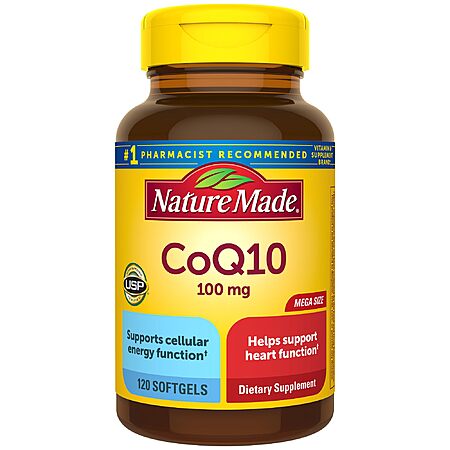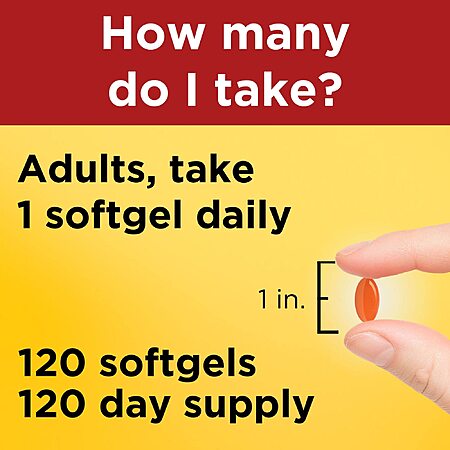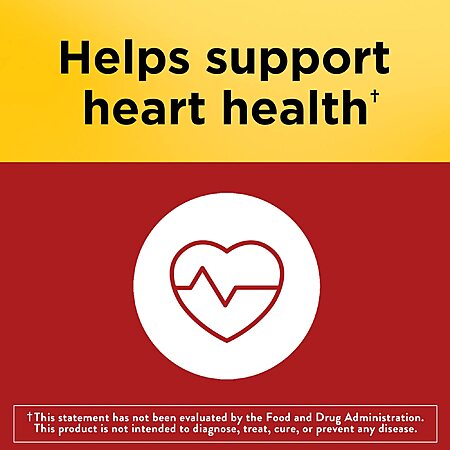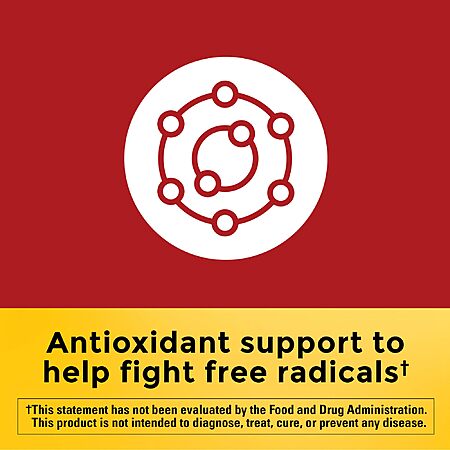Amazon has
120-Count Nature Made CoQ10 100mg Dietary Supplement for Heart Health Support Softgels for $21.61 - $6.48 when you
'clip' the 30% off coupon - $1.08 (5% off) when you
check out with Subscribe & Save =
$14.05.
Shipping is free w/ Prime or on orders $35+.
Thanks Deal Hunter
Rokket for sharing this deal
Note: You must be logged into your account. Coupons are typically one use per account. You have the flexibility to manage your
Subscribe & Save subscription at any time after your order ships. View
Subscribe & Save filler items and our
current Subscribe & Save Frontpage deals to unlock up to an extra 15% savings when you have 5 or more items in your current monthly subscription.
Features:
- Contains one 120 count bottle of Nature Made CoQ10 100 mg Softgels for a 120-day supply
- These Coenzyme Q10 100mg supplements provide antioxidant support to help fight free radicals in the body and to protect cells from oxidative damage
- Nature Made CoQ10 100mg softgels also provide support for heart health and healthy aging
- These gluten free CoQ10 supplements have no artificial flavors, no preservatives, and no color added - CoQ10 is naturally orange in color








Leave a Comment
Top Comments
"Ubiquinol is more effective and better absorbed." Evidence is mixed; in head-to-heads with optimized ubiquinone formulations, ubiquinone can match or exceed ubiquinol bioavailability. The review by Mantle & Dybring shows formulation (e.g., thermal crystal dispersion) can make ubiquinone more bioavailable than ubiquinol; many "ubiquinol wins" comparisons used non-optimized ubiquinone. Also, clinical efficacy data are stronger for ubiquinone in cardiovascular outcomes.
"If you're over 35–40, this is not very effective." There isn't strong clinical evidence that older adults cannot convert ubiquinone to ubiquinol. Studies in older men show both ubiquinone and ubiquinol supplementation raise plasma ubiquinol levels, with no statistically significant difference in some trials. Authoritative references also note ubiquinone is reduced to ubiquinol during/after absorption and constitutes ~95% of circulating CoQ10. A 2020 overview emphasizes conversion systems exist and challenges blanket claims that older people "need" ubiquinol.
Nuance you can use
Bioavailability varies widely by formulation; soft-gel capsules and technologies that disperse CoQ10 crystals or use appropriate lipids/encapsulation improve absorption regardless of form.
For specific scenarios (e.g., very high doses, certain malabsorption issues), some clinicians try ubiquinol; but for general use, especially for heart outcomes, ubiquinone has the stronger clinical trial track record.
Marketing from Kaneka/ubiquinol-branded sources asserts age-related conversion decline and superior absorption, but these are manufacturer claims and not definitive across independent trials. Independent reviews caution against these blanket assertions.
Bottom line for this Slickdeals product
Nature Made CoQ10 here is ubiquinone. It can still be effective, including in older adults, particularly if it's a good softgel formulation and taken with fat/food.
If you prefer ubiquinol or have tried ubiquinone without reaching target blood levels/symptom goals, switching to a reputable ubiquinol brand is reasonable—but it's not mandatory for everyone over 35–40, and the "not very effective" claim is not supported by robust evidence.
16 Comments
Sign up for a Slickdeals account to remove this ad.
Sign up for a Slickdeals account to remove this ad.
Our community has rated this post as helpful. If you agree, why not thank DavidL8545
"Ubiquinol is more effective and better absorbed." Evidence is mixed; in head-to-heads with optimized ubiquinone formulations, ubiquinone can match or exceed ubiquinol bioavailability. The review by Mantle & Dybring shows formulation (e.g., thermal crystal dispersion) can make ubiquinone more bioavailable than ubiquinol; many "ubiquinol wins" comparisons used non-optimized ubiquinone. Also, clinical efficacy data are stronger for ubiquinone in cardiovascular outcomes.
"If you're over 35–40, this [ubiquinone] is not very effective." There isn't strong clinical evidence that older adults cannot convert ubiquinone to ubiquinol. Studies in older men show both ubiquinone and ubiquinol supplementation raise plasma ubiquinol levels, with no statistically significant difference in some trials. Authoritative references also note ubiquinone is reduced to ubiquinol during/after absorption and constitutes ~95% of circulating CoQ10. A 2020 overview emphasizes conversion systems exist and challenges blanket claims that older people "need" ubiquinol.
Nuance you can use
Bioavailability varies widely by formulation; soft-gel capsules and technologies that disperse CoQ10 crystals or use appropriate lipids/encapsulation improve absorption regardless of form.
For specific scenarios (e.g., very high doses, certain malabsorption issues), some clinicians try ubiquinol; but for general use, especially for heart outcomes, ubiquinone has the stronger clinical trial track record.
Marketing from Kaneka/ubiquinol-branded sources asserts age-related conversion decline and superior absorption, but these are manufacturer claims and not definitive across independent trials. Independent reviews caution against these blanket assertions.
Bottom line for this Slickdeals product
Nature Made CoQ10 here is ubiquinone. It can still be effective, including in older adults, particularly if it's a good softgel formulation and taken with fat/food.
If you prefer ubiquinol or have tried ubiquinone without reaching target blood levels/symptom goals, switching to a reputable ubiquinol brand is reasonable—but it's not mandatory for everyone over 35–40, and the "not very effective" claim is not supported by robust evidence.
"Ubiquinol is more effective and better absorbed." Evidence is mixed; in head-to-heads with optimized ubiquinone formulations, ubiquinone can match or exceed ubiquinol bioavailability. The review by Mantle & Dybring shows formulation (e.g., thermal crystal dispersion) can make ubiquinone more bioavailable than ubiquinol; many "ubiquinol wins" comparisons used non-optimized ubiquinone. Also, clinical efficacy data are stronger for ubiquinone in cardiovascular outcomes.
"If you're over 35–40, this [ubiquinone] is not very effective." There isn't strong clinical evidence that older adults cannot convert ubiquinone to ubiquinol. Studies in older men show both ubiquinone and ubiquinol supplementation raise plasma ubiquinol levels, with no statistically significant difference in some trials. Authoritative references also note ubiquinone is reduced to ubiquinol during/after absorption and constitutes ~95% of circulating CoQ10. A 2020 overview emphasizes conversion systems exist and challenges blanket claims that older people "need" ubiquinol.
Nuance you can use
Bioavailability varies widely by formulation; soft-gel capsules and technologies that disperse CoQ10 crystals or use appropriate lipids/encapsulation improve absorption regardless of form.
For specific scenarios (e.g., very high doses, certain malabsorption issues), some clinicians try ubiquinol; but for general use, especially for heart outcomes, ubiquinone has the stronger clinical trial track record.
Marketing from Kaneka/ubiquinol-branded sources asserts age-related conversion decline and superior absorption, but these are manufacturer claims and not definitive across independent trials. Independent reviews caution against these blanket assertions.
Bottom line for this Slickdeals product
Nature Made CoQ10 here is ubiquinone. It can still be effective, including in older adults, particularly if it's a good softgel formulation and taken with fat/food.
If you prefer ubiquinol or have tried ubiquinone without reaching target blood levels/symptom goals, switching to a reputable ubiquinol brand is reasonable—but it's not mandatory for everyone over 35–40, and the "not very effective" claim is not supported by robust evidence.
I will say that at the time my ubiquinol levels were not where he wanted them when I was taking Co-Q10 gels and Ubiquinol got them where he wanted them to be. I take a pretty high statin dose and it was driving my ubiquinol levels down to almost nothing.
I will say that at the time my ubiquinol levels were not where he wanted them when I was taking Co-Q10 gels and Ubiquinol got them where he wanted them to be. I take a pretty high statin dose and it was driving my ubiquinol levels down to almost nothing.
Sign up for a Slickdeals account to remove this ad.
Leave a Comment